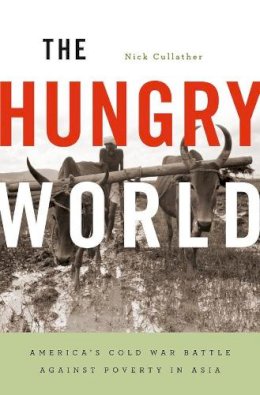
The Hungry World: America’s Cold War Battle against Poverty in Asia
Nick Cullather
Food was a critical front in the Cold War battle for Asia. “Where Communism goes, hunger follows” was the slogan of American nation builders who fanned out into the countryside to divert rivers, remodel villages, and introduce tractors, chemicals, and genes to multiply the crops consumed by millions. This “green revolution” has been credited with averting Malthusian famines, saving billions of lives, and jump-starting Asia’s economic revival. Bono and Bill Gates hail it as a model for revitalizing Africa’s economy. But this tale of science triumphant conceals a half century of political struggle from the Afghan highlands to the rice paddies of the Mekong Delta, a campaign to transform rural societies by changing the way people eat and grow food.
The ambition to lead Asia into an age of plenty grew alongside development theories that targeted hunger as a root cause of war. Scientific agriculture was an instrument for molding peasants into citizens with modern attitudes, loyalties, and reproductive habits. But food policies were as contested then as they are today. While Kennedy and Johnson envisioned Kansas-style agribusiness guarded by strategic hamlets, Indira Gandhi, Marcos, and Suharto inscribed their own visions of progress onto the land.
Out of this campaign, the costliest and most sustained effort for development ever undertaken, emerged the struggles for resources and identity that define the region today. As Obama revives the lost arts of Keynesianism and counter-insurgency, the history of these colossal projects reveals bitter and important lessons for today’s missions to feed a hungry world.
Product Details
About Nick Cullather
Reviews for The Hungry World: America’s Cold War Battle against Poverty in Asia
David Rieff
The Nation
Cullather’s book amounts to a thorough, gracefully written debunking of what might be called the green revolution master narrative… Cullather’s brilliant, concise early chapter on the Green Revolution’s birth in Mexico anchors his broader argument… By the end of the Mexico chapter, Cullather has already shattered the green revolution myth and exposed it as something like a lunge, and a not very well thought-out one, to replace other societies’ farming systems with our own highly problematic one.
Tom Philpott
Mother Jones
[This] is an utterly fascinating story—partially about the economics of famine, but mostly about the irrepressible postwar generation who genuinely believed American technology could win the battle for Asian hearts and minds, and stop communism in its tracks.
Paul Grant
Books & Culture
The Hungry World furnishes a striking vantage on development policy, as well as on the decidedly mixed outcomes of American engagement with Asian politics.
Katherine Maher
Bookforum
Nick Cullather’s exploration of the critical linkages between power politics, scientific and technical assistance, famine alarms and schemes to increase food production is one of the most original and engaging books to date on the impact of the cold war on the emerging states of the developing world.
Michael Adas, author of Dominance by Design: Technological Imperatives and America’s Civilizing Mission Nick Cullather’s pathbreaking book takes readers on a journey of understanding about the failures of the ‘development’ model so beloved by American policymakers from before the Cold War to the present. It may well become famous as a turning point about how to think about world poverty and to stimulate new answers to it.
Lloyd Gardner, author of Three Kings: The Rise of an American Empire in the Middle East after World War II A pioneering and transformative work that tracks the politics of hunger from the invention of the calorie to Asia’s Cold War ideological battlegrounds, The Hungry World explores, with a sharp, lively sense of irony, American scientists’ and policy-makers’ relentless and often futile efforts to transmute the conflictual politics of rural deprivation into a technocratic politics of agricultural production.
Paul A. Kramer, author of The Blood of Government: Race, Empire, the United States and the Philippines Facing insurgencies, U.S. officials and expert advisers want to fight famine, alleviate hunger, and ameliorate the conditions on which terrorism thrives. Nick Cullather’s new book—thoughtful, erudite, provocative—is a vivid and timely explication of the hopes and disappointments of past efforts to modernize and develop.
Melvyn Leffler, author of For the Soul of Mankind: The United States, the Soviet Union, and the Cold War
